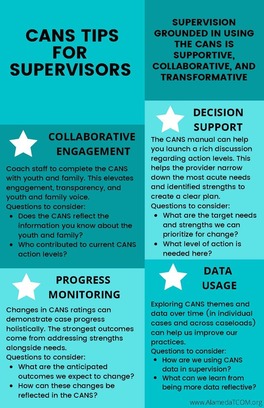Supervision
The CANS/ANSA is a helpful document that can be used in supervision to help organize clinical information collected during assessment in a consistent manner to improve communication among those involved in planning care for a child or adolescent. Supervisors can use the CANS/ANSA as a decision-support tool, as a quality improvement tool and as an outcome monitoring tool. Discussions about agreement on how the child’s needs and strengths are described provides the foundation for agreement about what approaches to take to address those needs and identify and build strengths.
CANS TIPS FOR SUPERVISORS

Supervision grounded in using the CANS is supportive, collaborative, and transformative. CANS helps guide service planning conversations and practice.
CANS & ANSA CASE REVIEW CHECKLIST FOR SUPERVISORS
- Supervisee has shared a copy of the most recent CANS assessment
- Was the assessment completed with the participation of youth, family, team members?
- If not, brainstorm ideas for building youth and family engagement using the CANS.
- What is getting in the clinician’s way of engaging the youth and family?
- What does the clinician need from me in order to overcome these roadblocks?
ALAMEDA ANSA TRAINING 2.0
An introduction to the ANSA tool from a supervisor's perspective. The training provides an overview to ANSA and directly addresses techniques, tools, and resources for engaging staff in its use. The Alameda ANSA Training 2.0 presentation has rolled out in Alameda county as a way to help supervisors better understand and adopt the tool with their staff.
An introduction to the ANSA tool from a supervisor's perspective. The training provides an overview to ANSA and directly addresses techniques, tools, and resources for engaging staff in its use. The Alameda ANSA Training 2.0 presentation has rolled out in Alameda county as a way to help supervisors better understand and adopt the tool with their staff.
CANS RESPONSIBILITIES ACROSS THE AGENCY
CANS is an assessment tool used not just by Clinicians, but by everyone across the agency. No matter your role or job position, you play an active part in the utilization of CANS—whether it’s through gathering information directly with families or assessing patterns in CANS data across programs.
CANS is an assessment tool used not just by Clinicians, but by everyone across the agency. No matter your role or job position, you play an active part in the utilization of CANS—whether it’s through gathering information directly with families or assessing patterns in CANS data across programs.
HOW TO COACH A SUPERVISEE THROUGH USING CAN/ANSA
7 Core Skills to Use During Supervision: Presence, Listening, Reflecting Back, Questioning, Feedback, Accountability, Modeling
7 Core Skills to Use During Supervision: Presence, Listening, Reflecting Back, Questioning, Feedback, Accountability, Modeling
- See How to Coach a Supervisee Through Using CANS/ANSA
- See General CANS Expectations (CANS Coaching Guide)
INCORPORATING THE CANS/ANSA INTO CLINICAL SUPERVISION
Many supervisors don’t quite know how to incorporate the CANS/ANSA into their supervision discussions with clinicians and other treatment team members. This tip sheet provides some key questions that supervisors can use to help bring the CANS/ANSA into the room.
Many supervisors don’t quite know how to incorporate the CANS/ANSA into their supervision discussions with clinicians and other treatment team members. This tip sheet provides some key questions that supervisors can use to help bring the CANS/ANSA into the room.
SUPERVISION USING THE CANS/ANSA
Responsibilities in Supervision
Opportunities in Supervision
|
Strategies used by Supervisors
|
